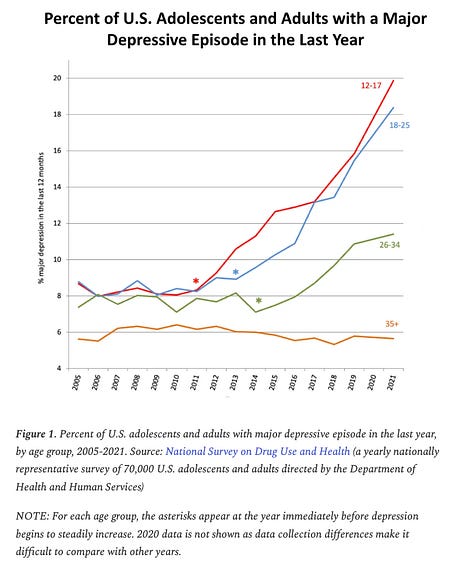Dr. Jean Twenge, Prognosticator
Twenge saw the impact of smart phones and social media on Gen Z's emotional health years before anyone else. Now she's out with a new book, and the message is, no generation is immune.
Six years after pinpointing the looming mental health crisis now engulfing American high school and college students, Jean Twenge is at it again. This time, though, she is looking at patterns across all generations. Here is how, in her own words, Twenge describes her new book, Generations, in the excellent Substack “After Babel.”
In my new book, Generations, I explore how technology is at the root of generational differences – not just for Gen Z but for all generations. I examine how the six generations with a quorum of living members – Silents, Boomers, Gen X, Millennials, Gen Z, and Polars – differ in everything from sexuality to politics to work attitudes to gender identity to wealth. These differences happen because technology has not only direct impacts but indirect ones, like the growth of individualism and the slowing of the life course (the latter is why, for example, Gen Z teens delay getting their driver’s licenses, Millennial young adults delay having children, and middle-aged Gen X’ers and Boomers look younger than their grandparents did at the same age.) My goal is to help the generations understand each other better by separating the myths from the realities of generations with as much data as possible (39 million people across 24 datasets).
One big focus in Generations is trends in mental health. After documenting the alarming rise in depression, anxiety, self-harm, and suicide among Gen Z teens, I was curious whether the increases had spread to Millennial, Gen X, and Boomer adults as well. I wanted to know:
Are adults also more likely to suffer from depression in recent years?
If so, what are the consequences of the rise in depression for democracy and society?
If so, what are the causes of the rise in depression for teens and adults?
With the launch of the new book, Twenge has been making the rounds. For a taste of the content, it is worth checking out some recent pieces featuring her work:
This review the Washington Post
Her interview on All Things Considered
Her piece in The Atlantic
Her article in The Globe and Mail
I’m hopeful (fingers crossed) to see how Twenge’s new material is received. Her last book iGen, put her in the crosshairs of many who wanted her predictions about the effects of social media and smartphones to be wrong—still holding out hope that devices and platforms designed to capture and commodify our attention could be good for us.
NYU professor Jon Haidt said to the Washington Post, “What was really interesting to me was how fiercely she was attacked by many psychologists,” Haidt said. “I think it’s now clear that she was absolutely right.”
Some of the data that Twenge released on Tuesday demonstrates just how absolutely right she was.







Here is to hoping that this time around, we are all listening.
Have a great weekend,
Erin
P.S. Thanks so everyone who sent me a response to my last post — if you were mulling it over and now a strike of genius has hit you, please send it over my way. The prompt was: to shoot me a note with one of the lessons you came to late, and would have been good to know earlier.
Welcome to the Internet
Could I interest you in everything? All of the time? A little bit of everything All of the time Apathy's a tragedy And boredom is a crime Anything and everything All of the time Bo Burnham, Welcome to the Internet If you have not yet watched Bo Burnham’s musical comedy




